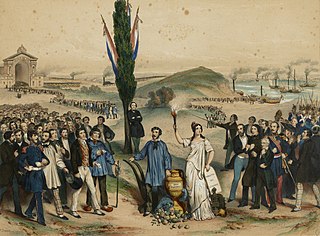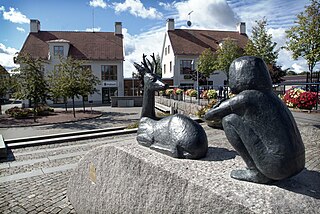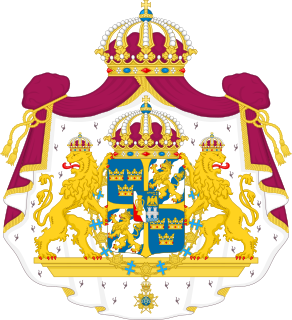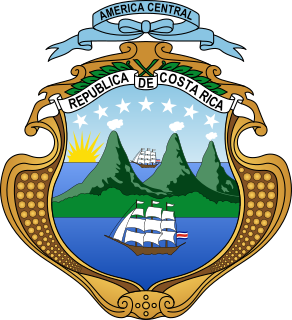Related Research Articles

Suffrage, political franchise, or simply franchise, is the right to vote in public, political elections. In some languages, and occasionally in English, the right to vote is called active suffrage, as distinct from passive suffrage, which is the right to stand for election. The combination of active and passive suffrage is sometimes called full suffrage.

Övertorneå Municipality is a municipality in Norrbotten County in northern Sweden, bordering Finland. Its seat is located in Övertorneå.

Lekeberg Municipality is a municipality in Örebro County in central Sweden. Its seat is located in the town of Fjugesta, with around 2,000 inhabitants.

Valdemarsvik Municipality is a municipality in Östergötland County in southeast Sweden. Its seat is located in the town of Valdemarsvik.

Karlstad Municipality is a municipality in Värmland County in west central Sweden. Its seat is located in the city of Karlstad.
The Basic Laws of Sweden are the four constitutional laws of the Kingdom of Sweden that regulate the Swedish political system, acting in a similar manner to the constitutions of most countries.

The Riksdag is the national legislature and the supreme decision-making body of Sweden. Since 1971, the Riksdag has been a unicameral legislature with 349 members, elected proportionally and serving, from 1994 onwards, on fixed four-year terms. As of 2021, the 2018 Swedish general election is the most recent held general election.

The Riksdag is the national legislature of Sweden. However, when it was founded in 1866 Sweden did not have a parliamentary system of government.
Elections in Sweden are held once every four years. At the highest level, all 349 members of Riksdag, the national parliament of Sweden, are elected in general elections. Elections to the 20 county councils and 290 municipal assemblies – all using almost the same electoral system – are held concurrently with the legislative elections on the second Sunday in September.

Women's suffrage is the right of women to vote in elections. Beginning in the mid-19th century, aside from the work being done by women for broad-based economic and political equality and for social reforms, women sought to change voting laws to allow them to vote. National and international organizations formed to coordinate efforts towards that objective, especially the International Woman Suffrage Alliance, as well as for equal civil rights for women.

The municipalities of Sweden are its lower-level local government entities. There are 290 municipalities which are responsible for a large proportion of local services, including schools, emergency services and physical planning.

Region Gotland, officially Gotlands kommun, is a municipality that covers the entire island of Gotland in Sweden. The city of Visby is the municipality's seat.
Since the introduction of parliamentarism in Sweden, six national referendums have been held. Legal provisions for referendums were introduced in 1922, one year after the adoption of universal suffrage. The Constitution of Sweden provides for binding referendums, but all referendums held as of 2012 have been non-binding. The latest referendum, on adopting the euro, was held on 14 September 2003.

The Republic of South Africa is a parliamentary republic with three-tier system of government and an independent judiciary, operating in a parliamentary system. Legislative authority is held by the Parliament of South Africa.

Women's suffrage – the right of women to vote – has been achieved at various times in countries throughout the world. In many nations, women's suffrage was granted before universal suffrage, so women and men from certain classes or races were still unable to vote. Some countries granted suffrage to both sexes at the same time. This timeline lists years when women's suffrage was enacted. Some countries are listed more than once, as the right was extended to more women according to age, land ownership, etc. In many cases, the first voting took place in a subsequent year.

Salomon Arvid Achates Lindman was a Swedish rear admiral, industrialist and conservative politician who served as Prime Minister of Sweden from 1906 to 1911 and again from 1928 to 1930.
A municipal council is the legislative body of a municipality or local government area. Depending on the location and classification of the municipality it may be known as a city council,town council, town board, community council, rural council,village council, or board of aldermen.

André Oscar Wallenberg was a Swedish banker, industrialist, naval officer, newspaper tycoon, politician and a member of the Wallenberg family. In 1856 Wallenberg founded the Stockholms Enskilda Bank, the predecessor of today's Skandinaviska Enskilda Banken.

The status and rights of Women in Sweden has changed several times throughout the history of Sweden. These changes have been affected by the culture, religion and laws of Sweden, as well as social discourses like the strong feminist movement.

Costa Rica’s municipal system is organized under the Municipal Code, the specific law that regulates the local governments. Municipalities are the second-level administration in Costa Rica after the central government. Each one of the 82 cantons of Costa Rica has a Municipality or Municipal Government constituted by a Mayor and a proportional number of members of the Municipal Council. Districts of each of the cantons also have their local authorities and representatives. Some of the services manage by local governments include; solid waste management, building and administration of local roads, parks, libraries and schools, recollection of municipal taxes and in some cases local security. Worth noticing that in Costa Rica city and municipality are not the same thing, as a canton can have several cities within its borders, generally as districts.
References
- 1 2 Aniansson, Britt Hägerhäll; Lohm, Ulrik (2002). "MUNICIPAL COUNCIL". In Svedin, Uno; Aniansson, Britt Hägerhäll (eds.). Sustainability, local democracy and the future: the Swedish model. Boston: Kluwer Academic Publishers. p. 86. ISBN 1-4020-0905-4. SELIBR 8658432.
- ↑ Swedish Local Authorities - a background at SusNordic Gateway site
- 1 2 3 "Kingdom of Sweden" (PDF). United Cities and Local Governments . Retrieved 21 November 2016.
- 1 2 3 4 "Municipalities, county councils and regions". Swedish Association of Local Authorities and Regions. Retrieved 21 November 2016.
- 1 2 Björn Tyrefors Hinnerich (2017). "Extended right to vote kick-started the economic development in Sweden". News from IFN. Research Institute of Industrial Economics.
- 1 2 3 "The history of the Riksdag". Riksdag . Retrieved 21 November 2016.
- 1 2 Olga Miroshnyk. 2009. Institute of local self-government in Sweden. Razumkov Centre. National Security & Defence, No. 1. page 39.
- ↑ Rudie Hulst, André van Montfort. 2007. Inter-municipal cooperation: a widespread phenomenon. Chapter 1 of Inter-Municipal Cooperation in Europe. Springer. page 1.
- ↑ Forsell, Håkan (2005). Property, tenancy & urban growth in Stockholm & Berlin, 1860-1920. Historical urban studies. Burlington, VT: Ashgate Pub. Company. p. 38. ISBN 0-7546-5507-5. SELIBR 10224115.